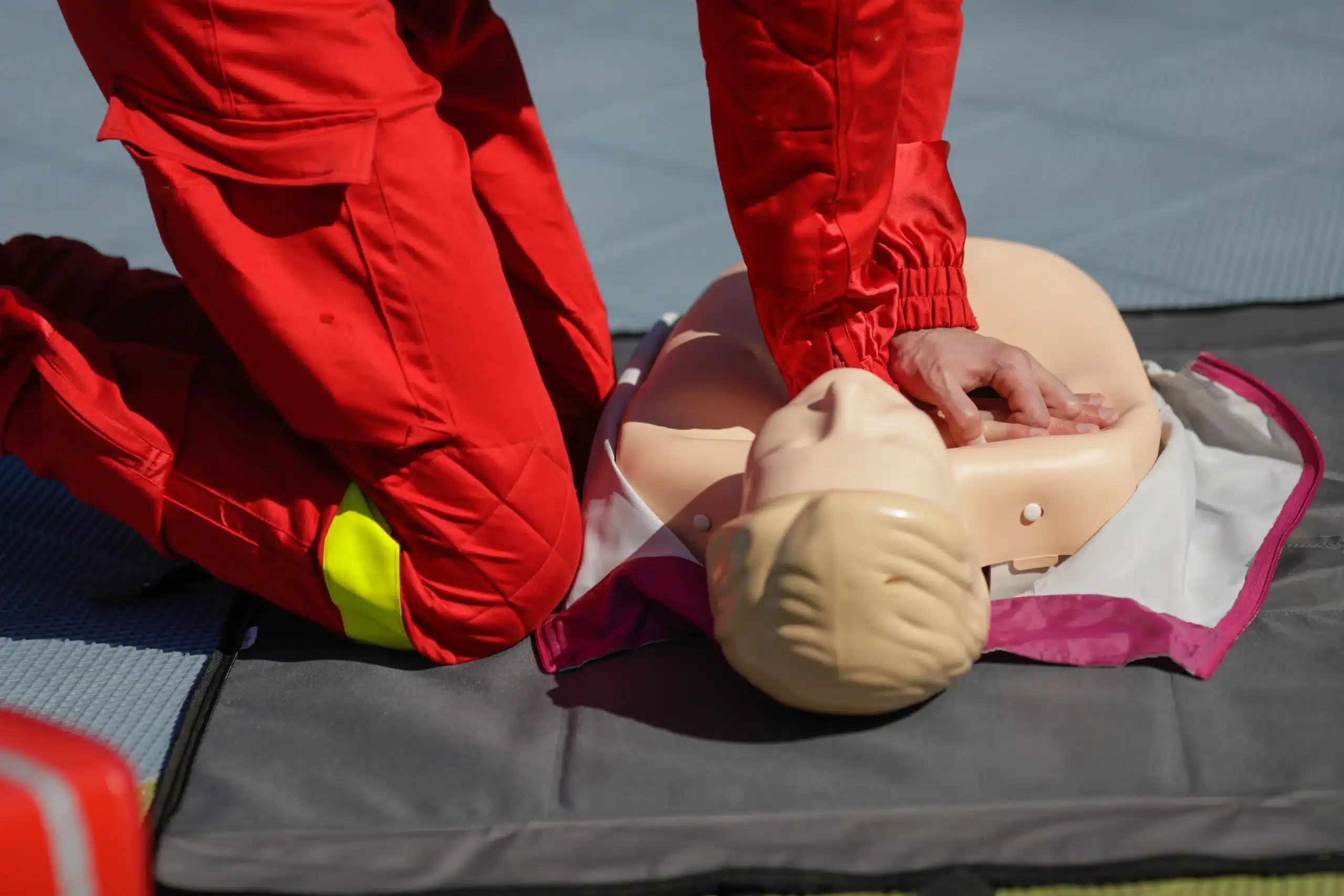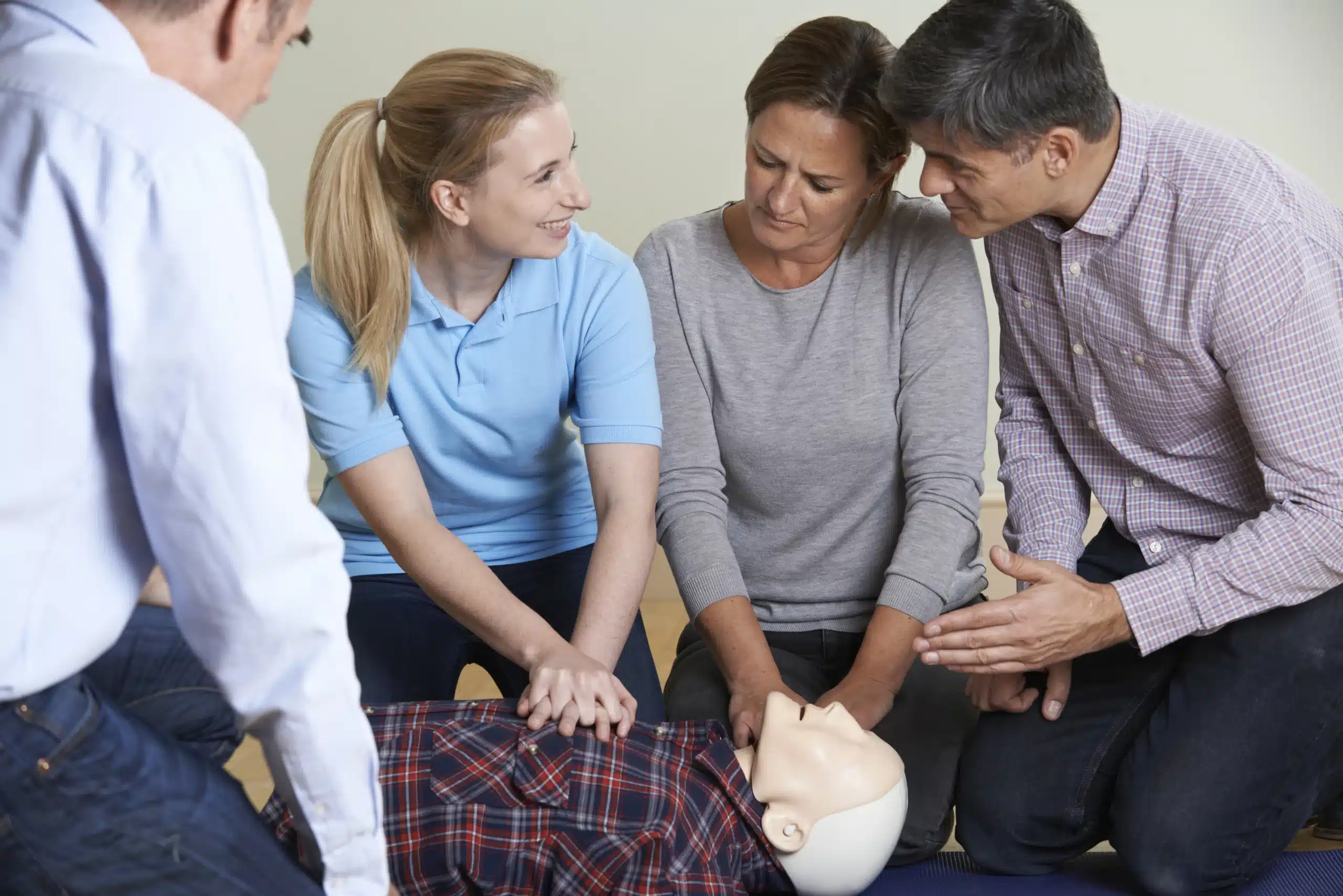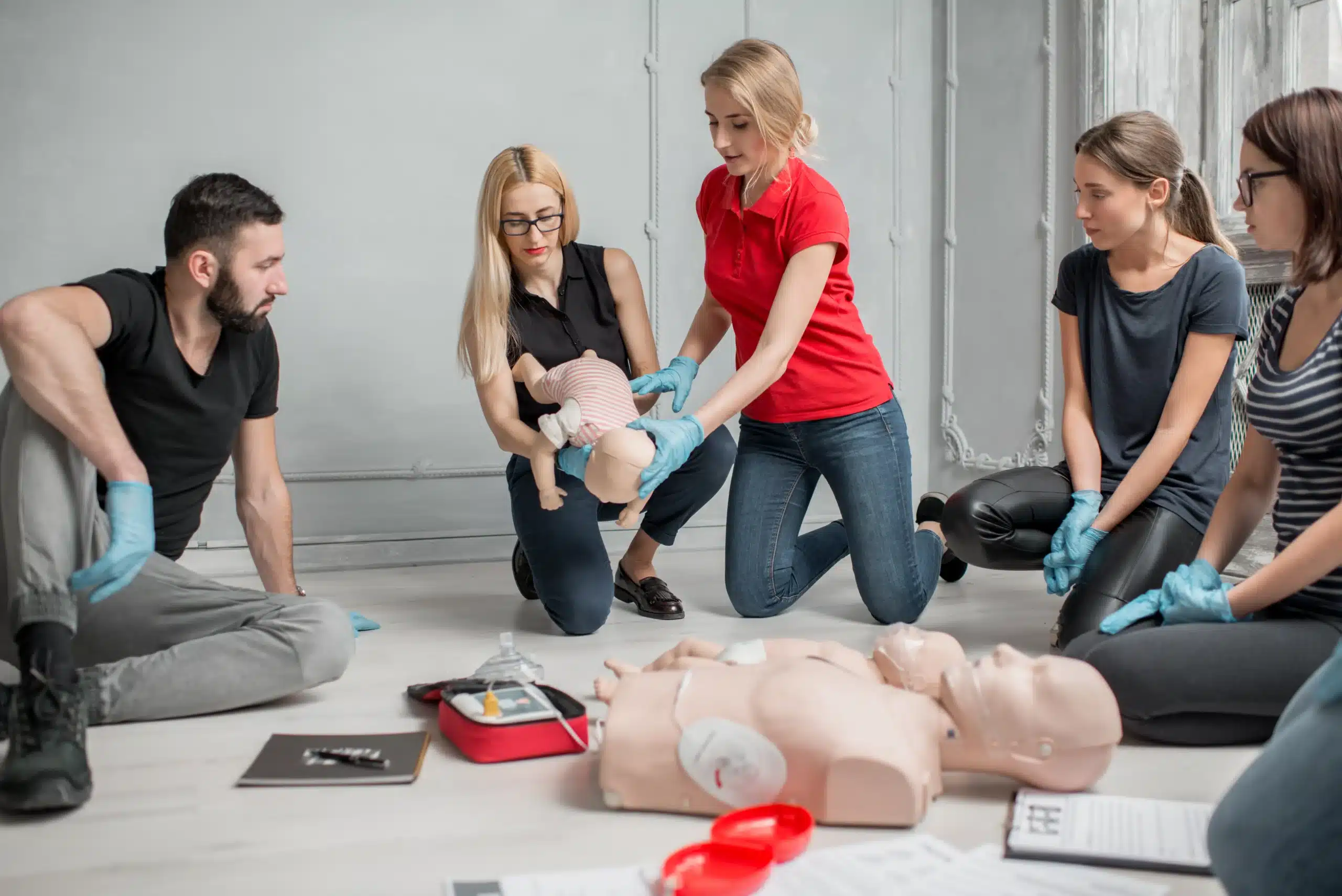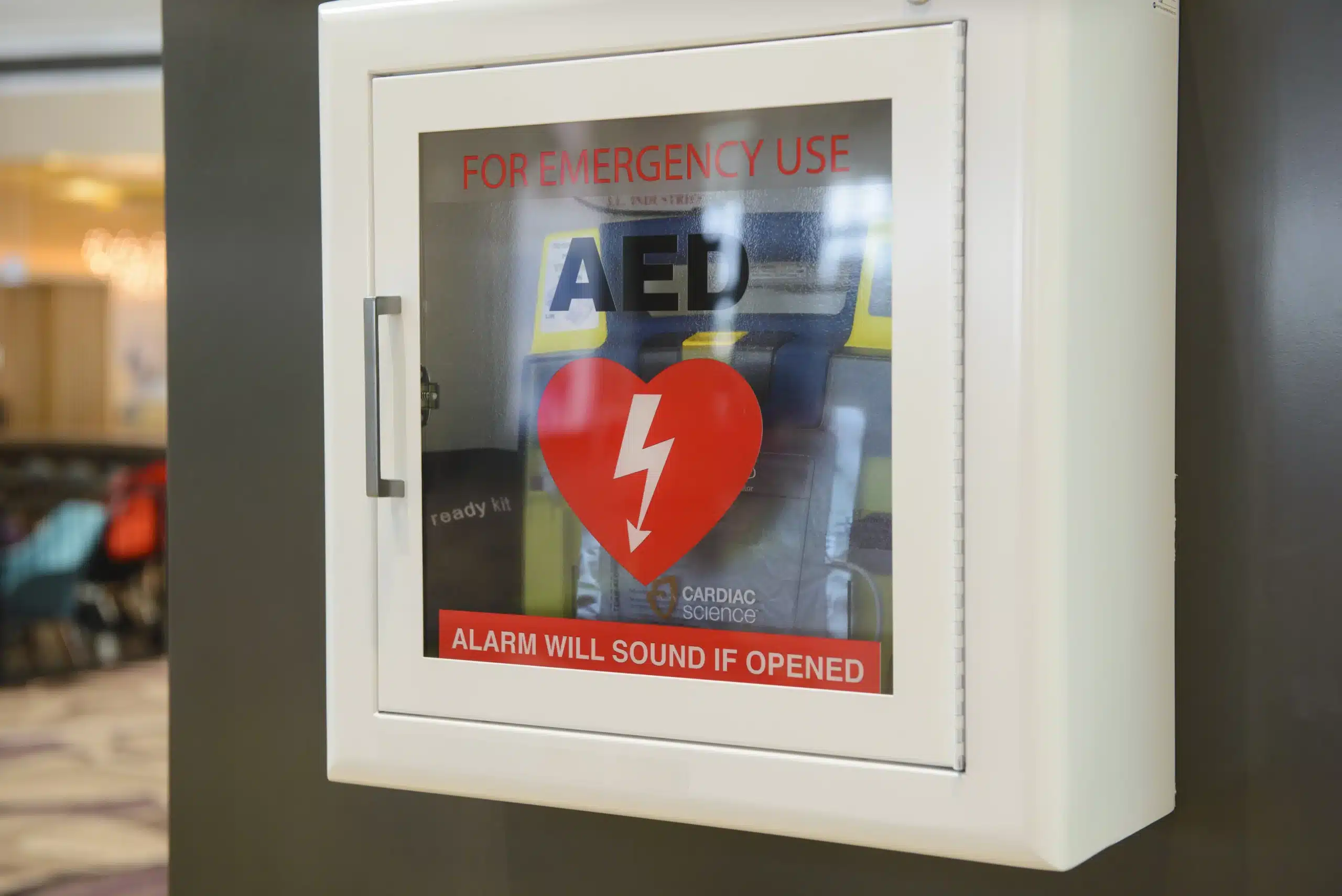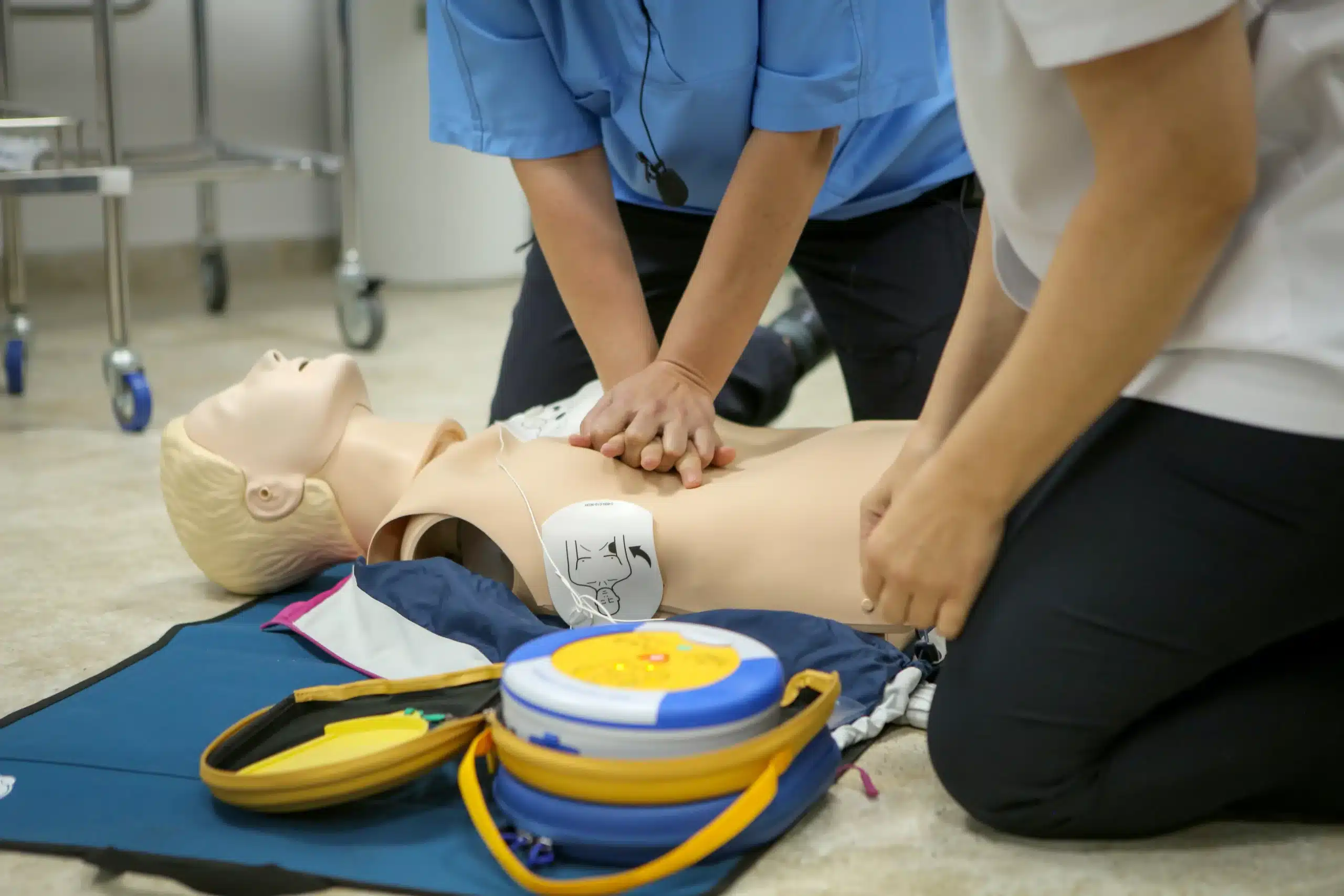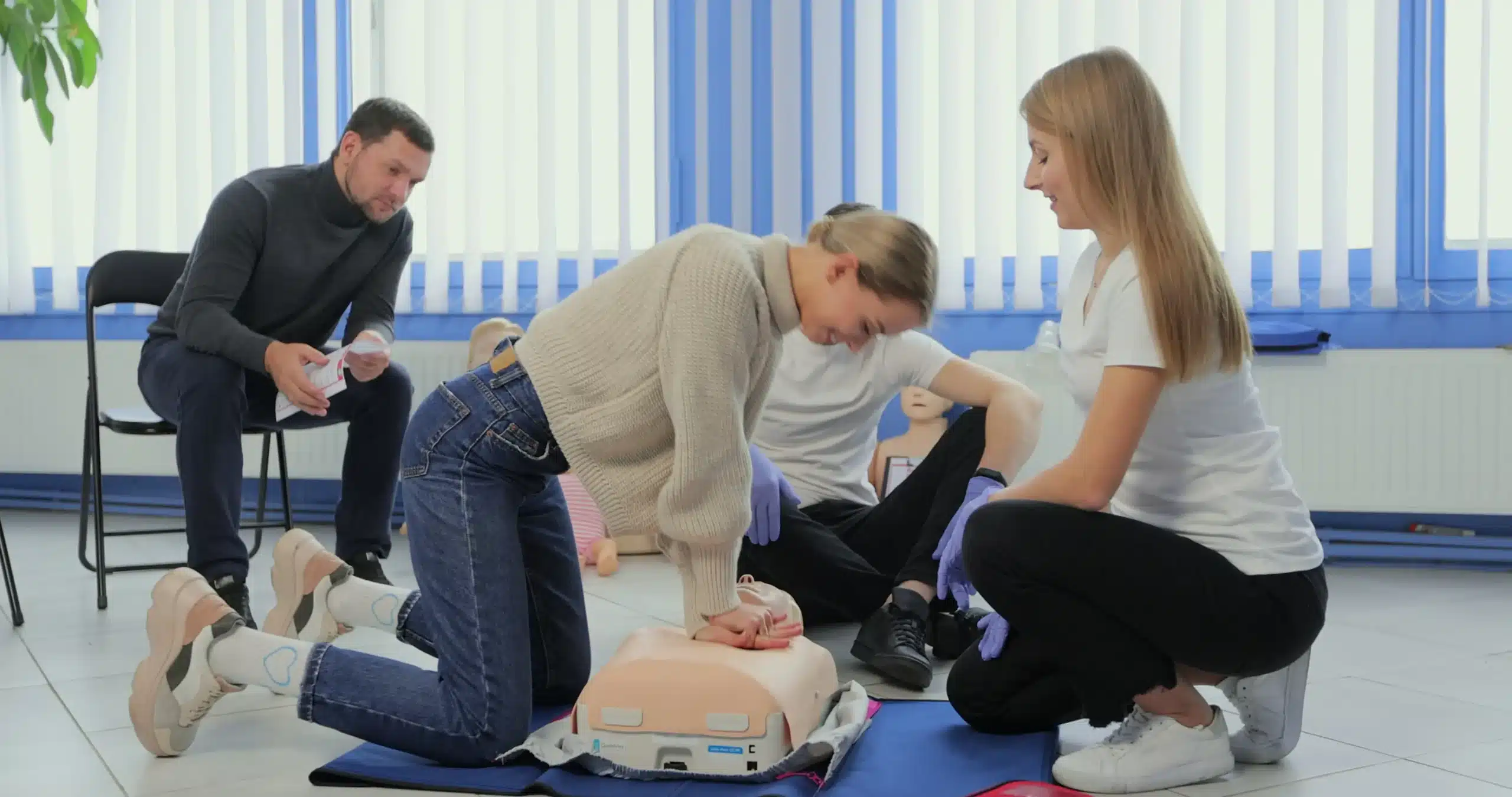Are you a healthcare provider in Davis seeking a more effective way to maintain your CPR skills? RQI, or Resuscitation Quality Improvement, is revolutionizing CPR training by focusing on consistent practice and real-time feedback. This modern approach helps healthcare professionals in Davis stay sharp and confident in their abilities, ultimately leading to better patient care. This article delves into the key differences between RQI and traditional CPR training, highlighting the benefits of RQI in Davis and how it can enhance your lifesaving skills. Discover how this innovative program can fit seamlessly into your busy schedule and empower you to make a real difference in emergencies.
Key Takeaways
- RQI builds and maintains crucial CPR skills: Frequent, short practice sessions help you retain lifesaving techniques and perform confidently in emergencies.
- RQI offers a flexible, blended learning experience: Combining online learning with hands-on practice using advanced manikins and simulation stations makes training convenient and engaging.
- RQI leads to better patient care: The program’s focus on high-quality CPR and consistent skill reinforcement translates to improved outcomes for cardiac arrest patients.
What is RQI?
What is RQI?
RQI stands for Resuscitation Quality Improvement. It’s a program designed to help healthcare professionals keep their CPR skills sharp. Think of it as a more modern, efficient way to get and maintain your American Heart Association certifications, like BLS, ACLS, and PALS. It’s especially helpful for medical professionals in and around Davis looking for a convenient way to stay certified. RQI is becoming increasingly popular because it focuses on building practical skills and improving patient outcomes. You can learn more about our RQI courses on our website. The American Heart Association also offers a helpful program overview if you’d like to explore the topic further.
The Low-Dose, High-Frequency Model
So, how does RQI actually work? It uses a “low-dose, high-frequency” approach. Instead of cramming all your training into one long session and then waiting two years for recertification, RQI encourages frequent, shorter practice sessions. This helps healthcare providers build and maintain their skills over time, leading to better skill retention—crucial in high-pressure situations. The American Heart Association explains that this model improves both competence and confidence in CPR. This article in Pharmacy Times points out that RQI can also be more cost-effective and time-efficient for hospitals and their staff.
RQI vs. Traditional CPR: Key Differences
RQI represents a significant shift in how we approach CPR training. It moves away from the traditional model and offers a more effective way to maintain crucial lifesaving skills. Here’s a breakdown of the key differences:
Prevent Skill Decay
Traditional CPR certification often involves a single class every two years. While this fulfills requirements, studies show that CPR skills decline significantly within just a few months. This decay can impact the effectiveness of CPR during a real emergency. RQI combats this by using frequent, short practice sessions to reinforce skills and build muscle memory. This “low-dose, high-frequency” approach helps ensure you’re always ready to respond. It’s like regularly exercising to stay in shape—short, consistent efforts are more effective than infrequent intense training.
Continuous Learning vs. Periodic Recertification
Instead of cramming for a big test every two years, RQI emphasizes ongoing practice and skill development. This continuous learning model helps maintain a higher level of proficiency over time. RQI integrates seamlessly into your workflow, making it easier to stay sharp and confident in your abilities. This consistent reinforcement helps build the kind of muscle memory that’s crucial in high-pressure emergency situations.
Real-Time Feedback and Assessment
RQI uses innovative technology to provide real-time feedback during practice. Manikins equipped with sensors measure the quality of compressions and ventilations, offering immediate guidance and helping you refine your technique. This personalized feedback is a key advantage of RQI, allowing you to identify areas for improvement and monitor progress. This data-driven approach ensures consistent high-quality CPR performance and builds confidence. You’re not just going through the motions—you’re actively learning and improving with every session.
RQI Certification Courses in Davis
Woodland CPR Classes offers a variety of RQI courses in Davis, catering to different certification levels and learning needs. Whether you’re a healthcare provider, a first responder, or simply want to improve your CPR skills, we have an RQI program for you. Our convenient location serves Woodland, Davis, and Sacramento, making high-quality CPR training accessible.
BLS RQI
The American Heart Association RQI (Resuscitation Quality Improvement) program is an efficient way for medical and healthcare professionals in Davis to earn their official American Heart Association BLS certification cards. This program emphasizes hands-on practice and immediate feedback, preparing you for real-life emergencies. RQI helps you learn the latest BLS techniques and maintain your skills through regular practice and assessments, building confidence and proficiency in CPR.
ACLS RQI
The RQI program offers a streamlined approach to Advanced Cardiovascular Life Support (ACLS) training, helping healthcare professionals maintain their skills effectively. This training method promotes continuous learning and skill retention—critical in high-pressure situations. ACLS RQI focuses on advanced techniques for managing cardiovascular emergencies, giving healthcare providers the knowledge and skills to deliver prompt and effective care.
PALS RQI
Through the RQI program, healthcare providers can refine their Pediatric Advanced Life Support (PALS) skills, leading to better outcomes for young patients. The program uses real-time feedback and skill assessments, essential for effective learning and application in critical care. PALS RQI covers the specialized techniques required to respond to pediatric emergencies, equipping healthcare professionals with the skills to provide life-saving care to infants and children.
Who Benefits from RQI in Davis?
Healthcare Professionals
RQI is a game-changer for healthcare professionals in Davis. It keeps your CPR skills sharp through frequent practice and assessment. This low-dose, high-frequency approach helps you retain information and perform confidently in emergencies. For nurses, doctors, EMTs, and other healthcare providers, maintaining top-notch CPR skills is essential. RQI helps ensure you’re always ready to provide the best possible care. The American Heart Association highlights how regular reinforcement through RQI leads to improved patient outcomes. Plus, studies show programs like RQI can significantly improve cardiac arrest survival rates. Woodland CPR Classes offers RQI courses tailored to healthcare providers in Davis, making it easy to integrate this valuable training into your busy schedule.
Individuals Seeking Advanced CPR Skills
RQI isn’t just for healthcare professionals. Anyone in Davis looking to gain advanced CPR skills can benefit from this program. Whether you’re a parent, teacher, coach, or simply someone who wants to be prepared, RQI empowers you with the knowledge and confidence to act quickly and effectively in a crisis. The program’s focus on regular practice and personalized feedback helps you master the critical components of high-quality CPR. Learn more about RQI and how it can help you become a more confident and skilled lifesaver. Woodland CPR Classes offers RQI training in Davis, equipping individuals with the skills they need to make a real difference. It’s a valuable investment in your own preparedness and the well-being of those around you.
How RQI Impacts CPR Skills and Patient Outcomes
Improve Skill Retention and Performance
RQI’s low-dose, high-frequency approach combats the natural decay of CPR skills. Instead of cramming for a big test every two years, healthcare providers refresh their knowledge and skills through short, frequent practice sessions. This consistent reinforcement helps solidify muscle memory and critical thinking, leading to improved CPR performance in real emergencies. Studies show RQI-trained providers demonstrate higher competency and retain those skills longer than those trained with traditional methods. This translates to more effective CPR and better patient outcomes. The American Heart Association offers more information on RQI’s impact on skill retention.
Build Confidence in Emergencies
Facing a cardiac arrest is incredibly stressful. Confidence in performing high-quality CPR makes all the difference. RQI builds this confidence through regular practice and feedback. Frequent assessments identify areas needing improvement, allowing providers to refine their technique and gain mastery. This ongoing reinforcement creates preparedness and reduces anxiety, empowering healthcare professionals to act decisively when lives are on the line. Learn more about how RQI builds provider confidence.
Increase Survival Rates and Improve Patient Care
The goal of any CPR program is to improve patient survival rates. RQI contributes to this by ensuring providers maintain high CPR competency. High-quality CPR is directly linked to increased survival rates after cardiac arrest. By emphasizing consistent practice and feedback, RQI equips providers with the skills to deliver effective compressions and ventilations, maximizing the chances of a positive patient outcome. MED-ED emphasizes the connection between RQI and improved patient outcomes. Woodland CPR Classes offers RQI training to help healthcare providers in Woodland, Davis, and Sacramento deliver the best possible care and contribute to saving more lives.
Register for RQI in Davis
Enroll in RQI Classes
The American Heart Association RQI (Resuscitation Quality Improvement) program is a popular and efficient way for medical and healthcare professionals in Davis to get their official American Heart Association BLS, ACLS, and PALS certification cards. Woodland CPR classes offers convenient RQI courses designed to fit your busy schedule.
What to Expect During RQI Training
RQI training uses a “low-dose, high-frequency” model. This means you’ll practice your skills regularly, in short sessions, instead of less frequent, longer recertification courses. This approach helps ensure you retain crucial CPR skills and can confidently respond in an emergency. The regular reinforcement provided by the RQI Program improves patient outcomes.
Online and Hands-On Practice
RQI courses involve a short online component (a few hours) that you can complete on your own time. You’ll then complete a hands-on skills test using a voice-assisted manikin (VAM). This combination of online learning and hands-on practice ensures you have both the knowledge and the practical skills to provide high-quality CPR. Contact us today to learn more about RQI courses in Davis.
The RQI Training Experience in Davis
RQI training in Davis offers a modern approach to CPR education. It combines online learning with hands-on practice using advanced technology. This blended learning style creates a dynamic and effective training experience. Here’s what you can expect:
Manikins and Simulation Stations
The RQI program uses realistic manikins and simulation stations. These stations provide a safe and controlled environment to practice your CPR skills. You’ll work with advanced manikins that mimic real-life scenarios, allowing you to develop muscle memory and confidence. The RQI 1Stop learning platform integrates online learning with these simulation stations for a seamless training experience. This hands-on practice is essential for mastering CPR techniques.
Cognitive Assessments and Skills Demonstration
RQI training goes beyond just physical practice. The program includes cognitive assessments to ensure a thorough understanding of CPR concepts. Through eLearning activities, you’ll test your knowledge and reinforce key principles. Demonstrating your CPR skills on the RQI Simulation Station provides a comprehensive evaluation of your abilities. This combination of knowledge and practical application ensures you’re prepared for real-life emergencies.
Flexible Learning and Personalized Feedback
One of RQI’s biggest advantages is its flexibility. The online platform lets you learn at your own pace and on your own schedule. The RQI program uses a mastery learning approach, meaning you focus on specific skills until you achieve proficiency. You’ll receive personalized feedback throughout the training, helping you identify areas for improvement and refine your technique. This tailored approach ensures you get the most out of your training. The user-friendly platform makes learning engaging and accessible.
RQI: Cost-Effective and Time-Efficient
RQI isn’t just a different way to learn CPR—it’s a smarter way. It’s designed to be both cost-effective and time-efficient, making high-quality CPR training more accessible. This approach benefits both individual healthcare providers and the organizations where they work. Let’s explore how RQI achieves these advantages.
Reduce Training Resources, Maintain Quality
Traditional CPR training often requires pulling healthcare providers away from their patients for extended periods. This can strain resources and disrupt workflows. RQI addresses this by offering shorter, more frequent training sessions. This “low-dose, high-frequency” model allows staff to refresh their skills regularly without sacrificing valuable patient care time. As the American Heart Association notes, this consistent reinforcement helps maintain high-quality CPR and can lead to improved patient outcomes. This means better care and more efficient use of your team’s time.
Streamlined Certification
RQI offers a streamlined path to CPR certification. Instead of lengthy, infrequent recertification courses, RQI uses short, regular practice sessions and assessments. This approach saves time and reinforces skills more effectively. Think of it like regular workouts—short, consistent effort builds strength over time. This flexible, personalized approach allows healthcare providers to fit training into their busy schedules, minimizing disruption. The result, as highlighted in Pharmacy Times, is higher CPR proficiency achieved in less time, at a lower cost, and with better skill retention. This makes staying up-to-date on CPR skills easier and more convenient.
RQI Resources and Support in Davis
Finding the right resources and support is key to succeeding with the RQI program. Davis offers excellent options for both in-person training and online resources to help you stay sharp.
Local Training Providers
Davis CPR Classes offers AHA-certified BLS, ACLS, and PALS courses using the RQI program. This makes getting your official certification cards convenient and efficient. They understand the demands on healthcare professionals and aim to provide a modern and streamlined approach to training.
Online Resources and Continuing Education
Beyond initial certification, staying current with the latest resuscitation guidelines is crucial. The RQI 1Stop learning platform provides online training, making it easier to access essential CPR and advanced life support refreshers. For ongoing development, RQI Partners offers continuing education focused on improving healthcare and verifying competencies. Their programs use a mastery learning approach with deliberate practice and assessments, ensuring you maintain high-quality skills.
The Future of CPR Training: RQI Advancements
Integrating VR and Advanced Technologies
Virtual reality (VR) and augmented reality (AR) are transforming CPR training. Unlike traditional classroom learning, VR/AR offers a more immersive and engaging experience. Imagine practicing compressions and rescue breaths in a realistic simulated environment, responding to various emergency scenarios without the need for a physical manikin. This immersive technology allows for personalized feedback and repetition, leading to improved skill retention. Plus, VR/AR training offers unparalleled accessibility. Learners can access training anytime, anywhere, making it easier to fit training into busy schedules. This flexibility is particularly beneficial for healthcare professionals who need to maintain their CPR skills consistently.
Resuscitation Science Improvements
RQI itself represents a significant advancement in resuscitation science. The emphasis on low-dose, high-frequency practice sessions, combined with real-time feedback, directly addresses the challenge of skill decay. RQI programs use sophisticated manikins and software to monitor performance, providing immediate feedback on compression depth, rate, and recoil. This data-driven approach ensures adherence to AHA standards and promotes continuous improvement. The combination of advanced technologies like VR with the principles of RQI creates a powerful synergy, optimizing CPR training for both learners and instructors. This innovative approach enhances the learning experience and contributes to better patient outcomes in real-world emergencies.
Related Articles
- CPR Training in Sacramento: Your Guide – Woodland CPR Classes
- RQI Classes in Woodland, CA – Woodland CPR Classes
- NRP Certification in Sacramento: A Complete Guide
- CPR Classes in Sacramento: A Complete Guide
- Online CPR Classes in Sacramento: Your Complete Guide – Woodland CPR Classes
Frequently Asked Questions
What exactly is RQI and how is it different from traditional CPR training? RQI, or Resuscitation Quality Improvement, is a more modern approach to CPR training. It focuses on short, frequent practice sessions to help you maintain your skills, rather than the traditional model of one long class every two years. This “low-dose, high-frequency” method helps you retain information better and build muscle memory, leading to improved performance in real emergencies. It also uses technology to provide real-time feedback, so you can constantly refine your technique.
I’m a busy healthcare professional. How can I fit RQI training into my schedule? RQI is designed to be flexible and efficient. The online portion lets you learn at your own pace, and the hands-on skills sessions are shorter and more frequent than traditional CPR classes. This makes it easier to integrate the training into your busy workday without major disruptions. Plus, many hospitals are incorporating RQI into their existing training programs, making it even more accessible.
Does RQI certification meet the same requirements as traditional CPR certification? Yes, RQI programs are endorsed by the American Heart Association and fulfill the same requirements as traditional CPR courses. Completing an RQI program will earn you an official AHA certification card, valid for two years, just like a traditional course. The difference lies in how you learn and maintain those skills.
How does RQI improve patient outcomes? RQI improves patient outcomes by ensuring healthcare providers maintain a higher level of CPR competency. The frequent practice and feedback help providers deliver more effective compressions and ventilations, which directly increases the chances of survival after a cardiac arrest. Also, the focus on skill retention means providers are more confident and prepared to act quickly in emergencies.
Where can I find RQI training in Davis? Woodland CPR Classes offers a variety of RQI courses in Davis, covering BLS, ACLS, and PALS. They provide convenient scheduling and a supportive learning environment. You can check their website for more information and to register for a course.
